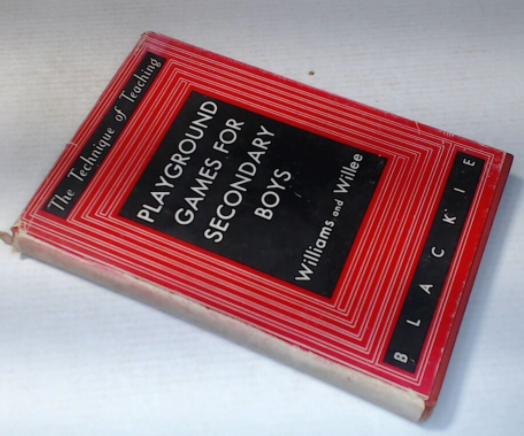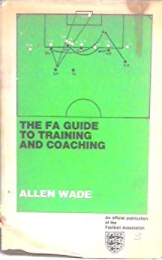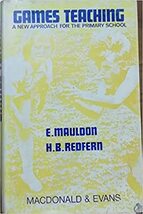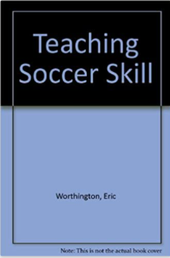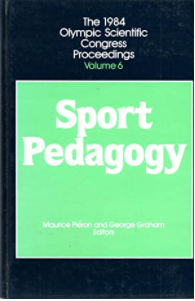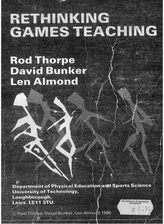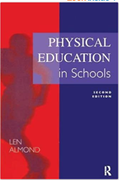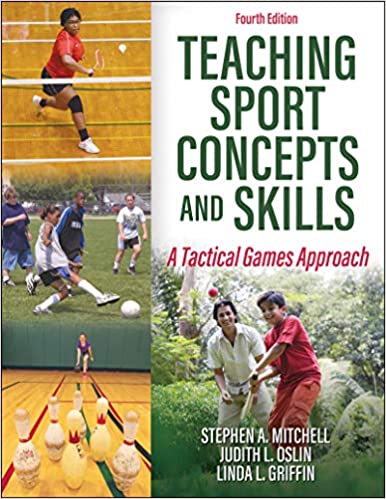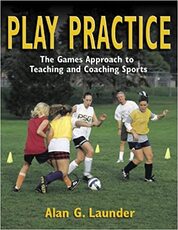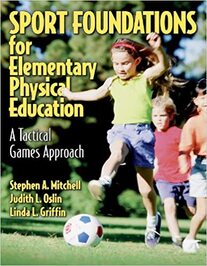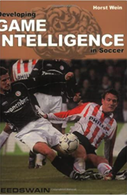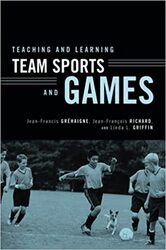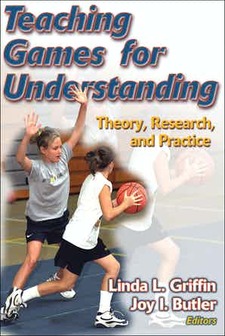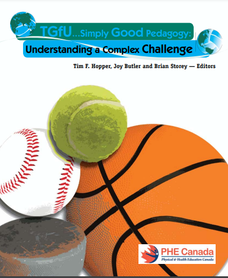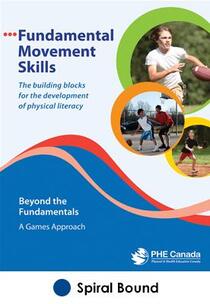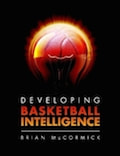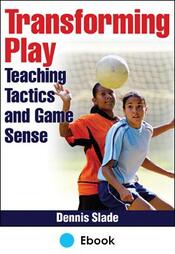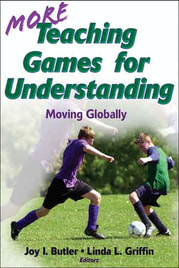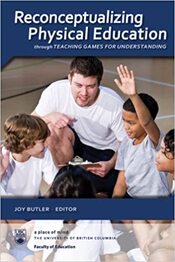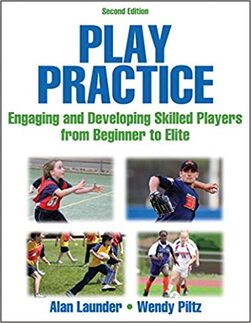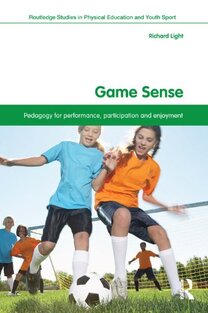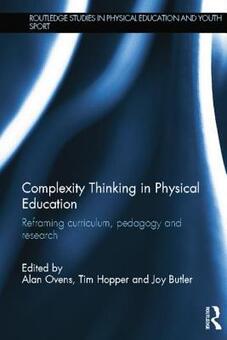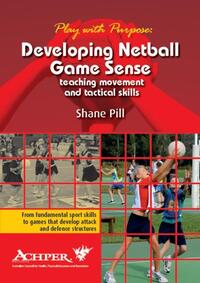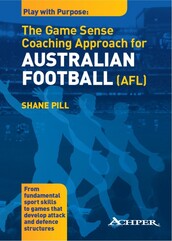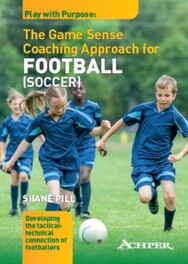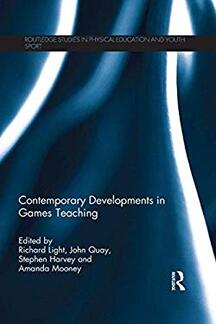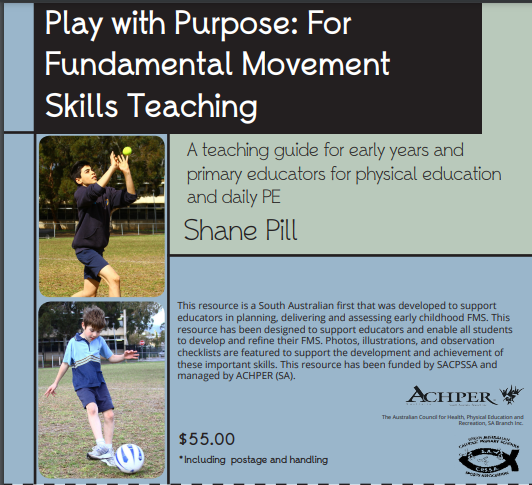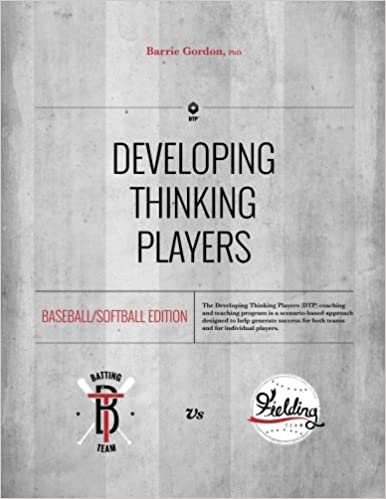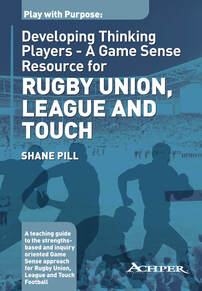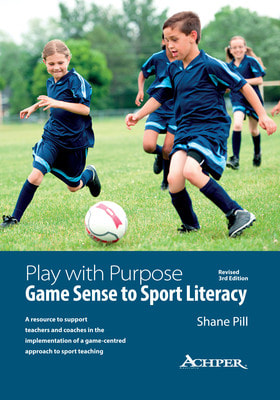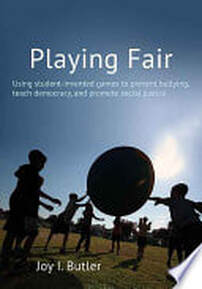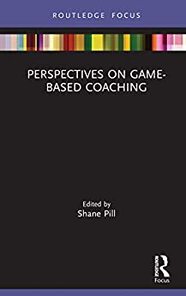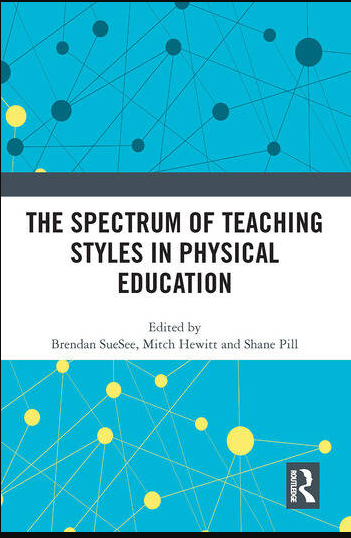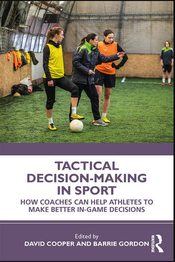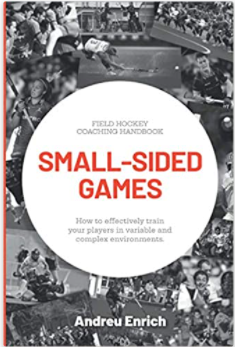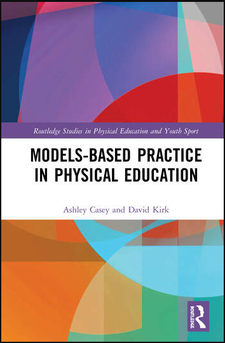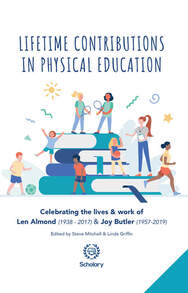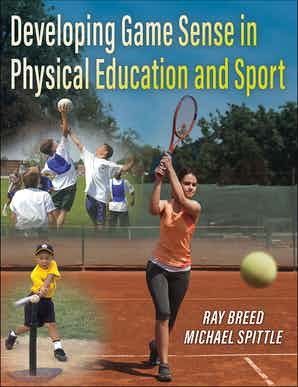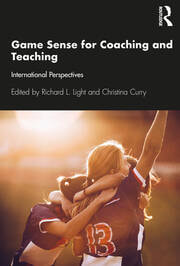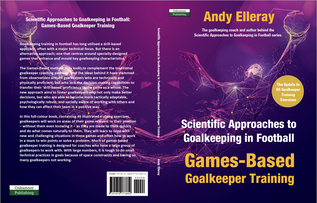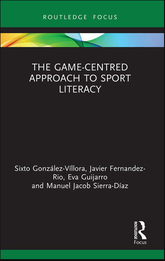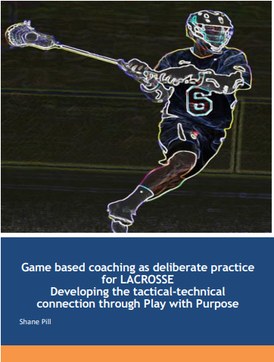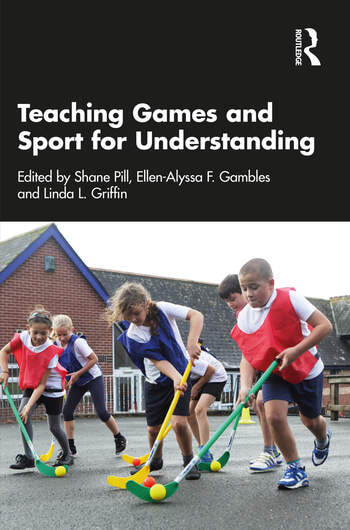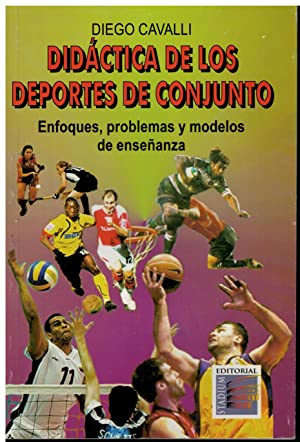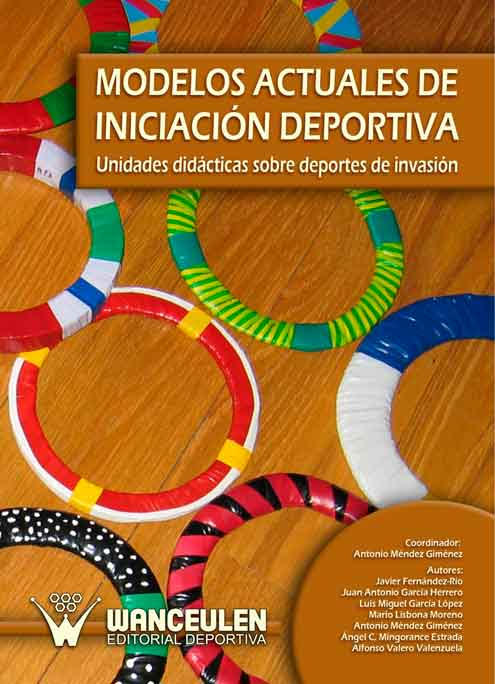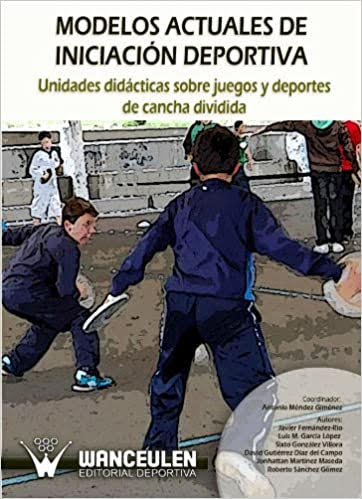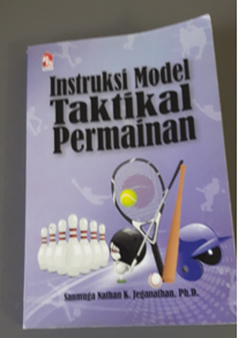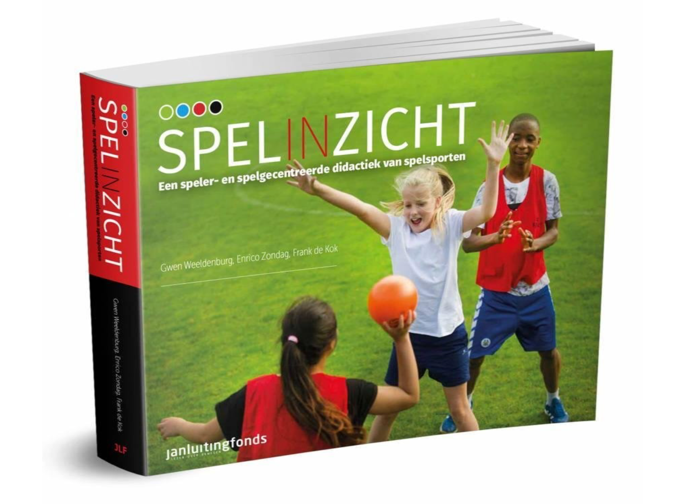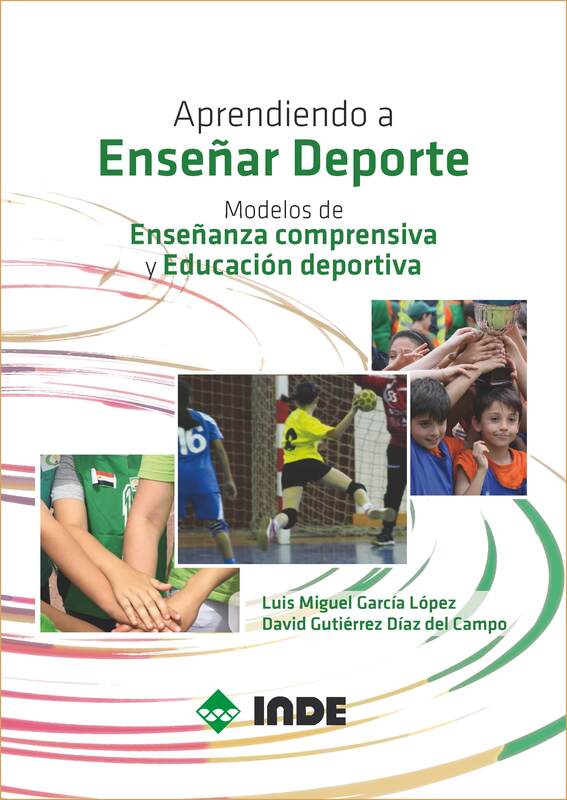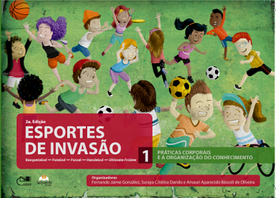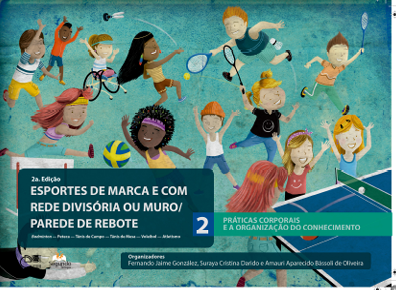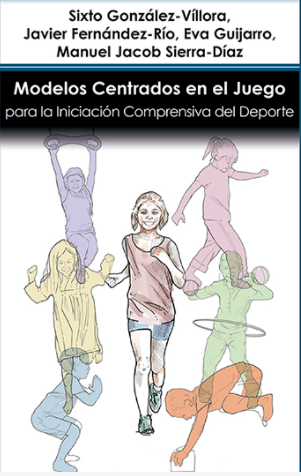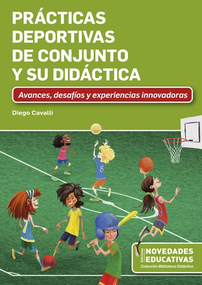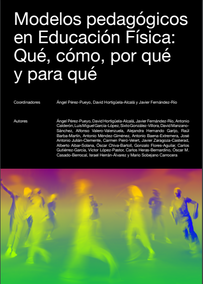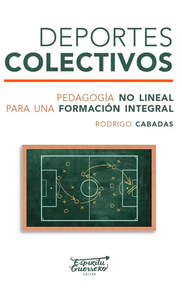Publications
Book Publications
All the books show how to inspire learning by focusing on the learners'/players' natural desire to play. Additional sections will be added that link to books in other languages from around the world that show how this approach has become a global phenomena.
The books outlined are in chronological order based upon their publication date, and provide details of the author(s), a short synopsis, picture and an example website where you can purchase the book from.
(Please note: the purchasing websites are not affiliated with the TGfU SIG. We do not have any influence, exchange of monies or control over purchase/delivery).
We are also aware that there are PE and sport books around the globe that have a chapter about GBAs. Therefore we have created an ongoing document providing the details for these resources. Please see the end of this page for the link.
The books outlined are in chronological order based upon their publication date, and provide details of the author(s), a short synopsis, picture and an example website where you can purchase the book from.
(Please note: the purchasing websites are not affiliated with the TGfU SIG. We do not have any influence, exchange of monies or control over purchase/delivery).
We are also aware that there are PE and sport books around the globe that have a chapter about GBAs. Therefore we have created an ongoing document providing the details for these resources. Please see the end of this page for the link.
Books in English
the teaching technique: playground games for secondary boys
the f.a. guide to training and coaching
|
Allen Wade (1967)
Allen Wade, the Director of Coaching for the Football Association (FA) authored this book in 1967. The book has over 140 line drawings and over 60 photographs making it an excellent practical resource for players, teachers and coaches. It includes specimen schedules for off-season and in-season, specialised goalkeeper training and activity programmes for amateur players with limited time and facilities. "The main purpose of the book...is to present ideas and principles which require coaches to think. They in turn, must provoke thought and enquiry among their players" (p. vii). The book is divided into three parts; (1) Principles, Systems and Tactics, (2) Principles of Training and Training Methods and (3) Definition and Acquisition of Skill. https://books.google.co.uk/books/about/The_F_A_Guide_to_Training_and_Coaching.html?id=sVS-ygAACAAJ&redir_esc=y |
GAMES TEACHING: A NEW APPROACH FOR THE PRIMARY SCHOOL
|
Elizabeth Mauldon and Betty Redfern (1969)
An early writing on games teaching similar to the later games-based approaches published in 1969. Mauldon and Redfern provide discussion on their four stage approach to teaching games from exploratory play to tactical and rule understanding and 'proper' games. They also discuss applying a thematic curriculum with primary school children. https://www.amazon.co.uk/Games-Teaching-Elizabeth-Mauldon/dp/0712107061 |
teaching soccer skill
|
Eric Worthington (1974)
This book added to the coaching literature a clear description of how and why to use small-sided games to teach game skills. Chapter 3 is a great read for any coach or teacher of an invasion game. In this chapter, Worthington sets out his coaching approach called Principles of Play. He asserted that, "with a practical understanding of the principles of play it is again a normal feature for such players to be able to fit into any system of play or formation" (p. 54). For this reason, Worthington proposed the use of small-sided games and the Principles of Play approach especially for young players. The following principles of play are contained in the approach: Delay in defence: first defender, Depth in defence: second defender, Concentration and balance in defence: the third defender, Depth and width in attack: the second attacker, Penetration in attack: the first attacker and Mobility in attack: the third attacker. https://books.google.co.uk/books/about/Teaching_Soccer_Skill.html?id=yN2EAQAACAAJ&redir_esc=y |
Sport Pedagogy : The 1984 Olympic Scientific Congress Proceedings Volume 6
|
George Graham and Maurice Pieron (Eds.) (1984- Human Kinetics 1986)
A collection of key papers presented at the pre-Olympic conference in Eugene, Oregon. Of note Rod Thorpe, David Bunker and Len Almond presented on "A Change in Focus for the Teaching of Games" which introduces their four pedagogical principles associated with the TGfU model. |
RETHINKING GAMES TEACHING
Physical Education in schools
|
Len Almond (Ed.) (1989)
At a time when PE has become a compulsory part of the National Curriculum, this book focuses on the role of PE and sport in schools. This edition includes sections on the National Curriculum, vocational education, GNVQ and GCSE. In this book, a discussion of the four pedagogical principles associated with the TGfU model are discussed with practical examples. https://www.amazon.co.uk/Physical-Education-Schools-Len-Almond/dp/113842112X |
TEACHING SPORT CONCEPTS AND SKILLS: A TACTICAL GAMES APPROACH
|
Stephen A. Mitchell, Judith L. Oslin and Linda L. Griffin (1997, 2006, 2013, 2021)
The popular book "Teaching Sport Concepts and Skills: A Tactical Games Approach for Ages 7 to 18" first published in 1997, with subsequent editions in 2006, 2013 and the latest 4th edition in 2021. The books cover the elementary, middle and secondary levels. It shows teachers how to move from a traditional to a tactical games teaching approach. The book offers more than 350 detailed lesson and unit plans that can be used as is or be easily modified and incorporated into an existing curriculum. More than 240 diagrams throughout the lessons make it easy to set up and execute the games. There are 14 video clips, delivered on HKPropel, that show some lessons in action—for example, the volleyball segments show complete question-and-answer sessions, highlighting an effective way to make sure students are understanding the lesson. Also available on HKPropel are reproducible forms, including a team contract, assessments, and game scenario worksheets for tactical problem solving. (For each thumbnail reproducible worksheet shown in the book, readers can download the full-size versions from HKPropel.) These resources will help teachers put concepts from the text into use with their students. It offers expert instruction and an array of multilevel games that provide an exciting and interactive environment for learning in all domains. Current and future teachers will learn how to structure positive and engaging learning experiences that set the stage for students to improve their performance, develop problem-solving skills, and enhance their lifelong enjoyment of sport. https://www.human-kinetics.co.uk/9781492590484/teaching-sport-concepts-and-skills/ |
PLAY PRACTICE: GAMES APPROACH TO TEACHING
|
Alan Launder (2001)
The Games Approach to Teaching and Coaching Sports presents a clear alternative to traditional approaches that will revitalize your own teaching and coaching. It replaces mindless games and mechanistic training methods with creative and enjoyable practice that improves students' skills and enhances their tactical understanding. This book focuses on teaching game play first instead of technique and skill, an approach that sets it apart from other games-approach texts. It provides answers to many of the problems that sports educators face, such as motivating reluctant or resistant students. It provides both the theoretical basis and the practical plans for changing practice from drudgery into an educational experience young people look forward to. https://www.amazon.co.uk/Play-Practice-Approach-Teaching-Coaching/dp/0736030050 |
SPORT FOUNDATION FOR ELEMENTARY PHYSICAL EDUCATION: A TACTICAL GAMES APPROACH
|
Stephen Mitchell, Judith Oslin and Linda Griffin (2003)
This book teaches the tactical games approach by game category: invasion games, net/wall games, striking/fielding games, and target games. This approach to teaching tactics, skills, and off-the-ball movements using modified or conditioned games allows greater flexibility for the teacher. What's more, it increases the transfer of tactics and skills across games for students and allows students to experience the excitement of play before practicing specific skills. For each game category, the book presents three progressive levels of units containing up to 30 detailed lesson plans. Each of the 91 lessons is designed to allow teachers flexibility in planning and progression. In addition to clearly explaining the concepts of tactical teaching, the authors provide a wealth of practical material for teaching and assessment. In particular, the chapter on assessment provides sample tools for authentic assessment in the psychomotor, cognitive, behavioural and social, and affective learning domains. Another chapter details how to build a curriculum using the games approach. https://www.amazon.com/Sport-Foundations-Elementary-Physical-Education/dp/0736038515 |
TEACHING GAMES FOR UNDERSTANDING IN PHYSICAL EDUCATION AND SPORT: AN INTERNATIONAL PERSPECTIVE
Butler, J.I., Griffin, L.L., Lombardo, B. & Nastasi, R. (Eds.) (2003)
Presents selected quality representative papers from the Teaching Games for Understanding Conference, which took place in New Hampshire in 2001.
Presents selected quality representative papers from the Teaching Games for Understanding Conference, which took place in New Hampshire in 2001.
Developing Game Intelligence in Soccer
|
Horst Wein (2004)
There is no greater power on the soccer field than the game intelligence of the players. With a great variety of attractive and effective simplified games, specially designed to simulate the most important game situations that may occur on the pitch, Horst Wein shows how to stimulate most of the aspects which are involved in game intelligence in young soccer players as well as professionals. Remember, Playing soccer without thinking is like shooting without aiming. https://www.amazon.com.au/Developing-Game-Intelligence-Soccer-Horst/dp/1591640717 |
TEACHING AND LEARNING TEAM SPORTS AND GAMES
|
Jean-Francis Gréhaigne, Jean-François Richard and Linda L. Griffin (Eds.) (2004)
Written as a resource for both pre-service and in-service educators, this theory-to-practice book focuses on the foundations and applications of constructivism applied to the teaching and learning of invasion sports and games. https://www.routledge.com/Teaching-and-Learning-Team-Sports-and-Games/Grehaigne-Richard-Griffin/p/book/9780415946407 |
TEACHING GAMES FOR UNDERSTANDING: THEORY. RESEARCH AND PRACTICE
|
Joy Butler and Linda Griffin (Eds.) (2005)
This book presents a comprehensive look at the TGfU model and provides multiple perspectives from 17 contributors in 6 countries. It details the history, theory, research, and practice of the approach (also known as the tactical games model and the games sense model) and enables readers to better understand and apply TGfU. The book explores why and how to involve students in the construction of games, how to use the model in curriculums at the elementary and secondary levels and in teacher education programs, and how assessment factors in. It examines how to integrate the model with sport education, covers the social interactions and decision-making processes involved in the model, and details the implications of model-based instruction for research on teaching. It also presents real-life stories of teachers successfully implementing this approach. Finally, it takes a look at the future direction for TGfU, considering its continuing evolution. Highly readable and widely applicable, this book is a vital text in the field of sport education, affording readers a solid foundation for understanding and using TGfU. As such, it is a valuable resource for preservice and in-service teachers, teacher educators, and coaches around the world. https://www.human-kinetics.co.uk/9780736045940/teaching-games-for-understanding/ |
TGFU- SIMPLY GOOD PEDAGOGY
|
Tim Hopper, Joy Butler and Brian Storey (Eds.) (2009)
A product of the 4th Annual International TGfU Conference. An ideal text for preservice teacher education programs. Brings together the ideas and perspectives of leading global. This text highlights the current research and practice from around the world in games teaching and coaching inspired by the TGfU approach. A selection of accepted papers from the conference form the basis of the texts. The book is divided into four sections. Section 1 offers a broader introduction to the TGfU approach offering an overview of the approach, insights on learning and a historical perspective on the roots of the TGfU approach. Section 2 focuses on how TGfU has generated new ideas in the physical education curriculum. Section 3 focuses on coaching approaches for developing tactical understanding and skill performance in novice and expert players. Section 4 focuses on innovations informed by the TGfU approach and how these are implemented by both in-service and pre-service teacher settings. https://books.google.co.uk/books/about/TGFU_Simply_Good_Pedagogy.html?id=N7EsQwAACAAJ&redir_esc=y |
FMS: BEYOND THE FUNDAMENTALS A GAMES APPROACH
|
PHE Canada (2009)
This book is designed for physical activity leaders of youths ages 11 through 18 in the Train to Train and Active for Life stages of the LTAD Model. This resource provides the theory and practice for young people to develop more specialized and contextualized variations of fundamental movement skills that are transferable to several sports. This handbook introduces and addresses a tactical games approach within the contexts of skill development and fitness games, striking and fielding games, net and wall games, and territorial games. It focuses on the step-by-step process of using games to develop and refine movement skills in complex sport situations and reflects the cognitive and emotional aspects of sport. The book builds on fitness-related concepts such as speed, strength, stamina, coordination, balance, and agility as related to game play. Finally, it provides examples of assessment tools, suggested readings, and useful resources. https://phecanada.ca/programs/fundamental-movement-skills-series |
developing basketball intelligence
|
Brian McCormick (2009)
The premise behind the book is to helps coaches develop SMARTER basketball players. It provides great information for the youth coach first learning the concepts of the game. It also provides some great tips and drills for the advanced coach looking to learn a few more things. This book includes the how, why, and when while explaining the basketball concepts and teaches the coach how to teach the players the concepts. It provides sample questions that you could ask the players to further enhance their knowledge of the game. It also has TONS of drills to improve skills and game performance and progressions and regressions. https://www.breakthroughbasketball.com/store/product.html?id=130 |
TRANSFORMING PLAY: TEACHING TACTICS AND GAMES SENSE
|
Dennis Slade (2010)
The traditional, highly structured, teacher-directed approach of teaching tactics and skills separate from games is quite boring for kids—who, after all, just want to play the game. Transforming Play: Teaching Tactics and Game Sense shows you how to use games to keep kids active and involved. It also shows you how to teach kids the fundamental movement skills and knowledge of basic game strategy that will help them develop a lifelong love of activity. You will learn how using a game sense approach to teaching games and sports can make activity meaningful for all kids, from the novice to the very skilled. https://us.humankinetics.com/products/transforming-play-pdf |
MORE TEACHING GAMES FOR UNDERSTANDING: MOVING GLOBALLY
|
Joy Butler and Linda L. Griffin (Eds.) (2010)
With "More Teaching Games for Understanding: Moving Globally," you can learn and apply an innovative approach to teaching games that has been used around the world for 30 years in school and sport settings. Editors Joy Butler and Linda Griffin bring the teaching games for understanding (TGfU) approach to life for you in this practical book. "More Teaching Games for Understanding" follows Griffin and Butler's highly successful 2005 book, "Teaching Games for Understanding." This new book is based on the Fourth International TGfU Conference held in 2008 and includes all-new chapters written by 27 world-renowned contributors representing 6 countries. The preface and foreword are written by the founders of TGfU, Rod Thorpe, David Bunker, and Len Almond. This book is not a rehash or a revision of the 2005 book; it presents all-new material on TGfU. https://www.human-kinetics.co.uk/9780736083348/more-teaching-games-for-understanding/ |
RECONCEPTUALIZING PHYSICAL EDUCATION THROUGH TEACHING GAMES FOR UNDERSTANDING
|
Joy Butler (Ed.) (2012)
By using Teaching Games for Understanding (TgfU) as a catalyst for thinking about ontological and epistemological issues in Physical Education, the teachers, researchers, and authors of this book have become ambassadors for new ideas that challenge some of our entrenched educational values. We are proud to be able to share some of their pioneering research, which we believe will be of great interest to others in the field who are interested in constructivist, student-centred, and holistic approaches to teaching and learning in games education. https://www.amazon.co.uk/Reconceptualizing-Physical-Education-Teaching-Understanding/dp/1105021998 |
PLAY PRACTICE: ENGAGING AND DEVELOPING SKILLED PLAYERS FROM BEGINNER TO ELITE
|
Alan Launder and Wendy Plitz (2013)
This book focuses on teaching game play first instead of technique and skill an approach that sets it apart from other games approach texts. It provides answers to many of the problems that sports educators face, such as motivating reluctant or resistant students. Part I introduces the innovative Play Practice approach and explains how it can lead to more effective coaching and teaching. Part II applies Play Practice to a great variety of games and describes specific approaches to improving technical ability and developing game sense. Part III discusses techniques the sports educator can use to make the Play Practice approach most effective. The book s 50 illustrations and 20 photos demonstrate specific approaches to games as well as ideas that can work for multiple games. These features will help you visualize how to apply the Play Practice approach with beginners as well as elite players in sports as diverse as skiing and tennis. This book will challenge your thinking about how sports should be taught, help you reassess your own methods, and provide a new and versatile model you can apply with great success one practice, one game at a time. https://www.amazon.co.uk/Play-Practice-Launder-Wendy-Piltz/dp/0736097007 |
GAMES SENSE: PEDAGOGY FOR PERFORMANCE, PARTICIPATION AND ENJOYMENT
|
Richard Light (2013)
Game Sense is an exciting and innovative approach to coaching and physical education that places the game at the heart of the session. It encourages the player to develop skills in a realistic context, to become more tactically aware, to make better decisions and to have more fun. Game Sense is a comprehensive, research-informed introduction to the Game Sense approach that defines and explores key concepts and essential pedagogical theory, and that offers an extensive series of practical examples and plans for using Game Sense in real teaching and coaching situations. The first section of the book helps the reader to understand how learning occurs and how this informs player-centred pedagogy. It also explains the relationship between Game Sense and other approaches to Teaching Games for Understanding. The second section of the book demonstrates how the theory can be applied in practice, providing a detailed, step-by-step guide to using Game Sense in eleven sports, including soccer, basketball, field hockey and softball. Game Sense is invaluable reading for all students of physical education or sports coaching, any in-service physical education teacher or any sports coach working with children or young people. https://www.routledge.com/Game-Sense-Pedagogy-for-Performance-Participation-and-Enjoyment/Light/p/book/9780415532884 |
COMPLEXITY THINKING IN PHYSICAL EDUCATION: REFRAMING CURRICULUM, PEDAGOGY AND RESEARCH
|
Alan Ovens, Tim Hopper and Joy Butler (Eds.) (2014)
In the past two decades, complexity thinking has emerged as an important theoretical response to the limitations of orthodox ways of understanding educational phenomena. Complexity provides ways of understanding that embrace uncertainty, non-linearity and the inevitable ‘messiness’ that is inherent in educational settings, paying attention to the ways in which the whole is greater than the sum of its parts. This is the first book to focus on complexity thinking in the context of physical education, enabling fresh ways of thinking about research, teaching, curriculum and learning. Written by a team of leading international physical education scholars, the book highlights how the considerable theoretical promise of complexity can be reflected in the actual policies, pedagogies and practices of physical education. It encourages teachers, educators and researchers to embrace notions of learning that are more organic and emergent, to allow the inherent complexity of pedagogical work in PE to be examined more broadly and inclusively. In doing so, Complexity Thinking in Physical Education makes a major contribution to our understanding of pedagogy, curriculum design and development, human movement and educational practice. https://www.routledge.com/Complexity-Thinking-in-Physical-Education-Reframing-Curriculum-Pedagogy/Ovens-Hopper-Butler/p/book/9780415645171 |
PLAY WITH PURPOSE: DEVELOPING NETBALL GAMES SENSE
|
Shane Pill (2014)
Play with Purpose: Developing Netball Game Sense focuses on a game-centred Game Sense approach to teaching netball. This resource presents a long term development model for Game Sense sport teaching for novice-beginners through to experienced netball players. It will enhance netball players game development at all stages of the players game learning. The resource emphasises learning of the strategies and skills required to participate more confidently and in a 'thinking' way. The book contains more than 40 successful, modified and lead-up games structured with a particular focus for maximum participation. Examples of Key Questions at each level of game development are included, as well as examples of game modifications to challenge or further develop skill learning. Games flow from 'fundamental sport skills' to 'developing a game plan'. It is relevant for teachers and coaches from primary aged children to youth and adult netball. https://www.achper.org.au/products/all/play-with-purpose-developing-netball-game-sense |
PLAY WITH PURPOSE: THE GAMES SENSE COACHING APPROACH FOR AFL
|
Shane Pill (2015)
Play with Purpose: Developing Game Sense in AFL Footballers is a book that enhances Australian football sport teaching by instructing teachers and coaches how to teach football without students in lines and ‘waiting for a turn’. The book bridges the gap between the game sense theory and practical application of game-centred skill teaching. The activities are user friendly, with easy to understand diagrams, questions and activities. This is an essential resource for all Australian football teachers and coaches. https://www.achper.org.au/products/all/play-with-purpose-the-game-sense-coaching-approach-for-australian-football-afl |
PLAY WITH PURPOSE: THE GAMES SENSE COACHING APPROACH FOR SOCCER
|
Shane Pill (2015)
This resource emphasises learning of the tactical and technical connection required for expertise right from players beginning game development. The player-central and game-based nature of the Game Sense approach shown in this resource works with the fundamental reason for participation - to play. Play with Purpose: The Game Sense Coaching Approach for Football (Soccer) explains the Game Sense coaching approach at each stage of player development, and contains more than 50 game-based practice activities, with examples of focus questions and game modifications for every activity. It is relevant for teachers and coaches from primary aged children to youth and adult football. The resource can also be used as a developmental model for clubs to base their player pathway programs. https://www.achper.org.au/products/all/play-with-purpose-the-game-sense-coaching-approach-for-football-soccer |
CONTEMPORARY DEVELOPMENTS IN GAMES TEACHING
|
Richard Light, John Quay, Stephen Harvey and Amanda Mooney (Eds.) (2015)
The teaching of games is a central component of any physical education or youth sport programme. Contemporary Developments in Games Teaching brings together leading international researchers and practitioners in physical education and sports coaching to examine new approaches in games teaching and team sport coaching that are player/student-centred and inquiry-based. The book aims to bridge the gap between research and practice by exploring contemporary games teaching from pedagogical, policy and research perspectives. It offers interesting new commentary and research data on well-established models such as Teaching Games for Understanding (TGfU), Game Sense, and the Games Concept Approach (GCA), as well as introducing innovative and exciting approaches emerging in East Asia, including Singapore, Japan and Taiwan. Representing the most up-to-date survey of new work in contemporary games teaching around the world, this book is invaluable reading for any student, researcher, in-service teacher or sports coach with an interest in games teaching or physical education. https://www.routledge.com/Contemporary-Developments-in-Games-Teaching/Light-Quay-Harvey-Mooney/p/book/9781138908192 |
PLAY WITH PURPOSE: FOR FUNDAMENTAL MOVEMENT SKILLS TEACHING
|
Shane Pill (2015)
A teaching guide for early years and primary educators for physical education and daily PE. Fundamental Movement Skill development is an important part of the curriculum. Children’s perceptions of self as competent, confident and socially accepted within physical activity contexts influences their positive mind towards physical activity seeking behaviour, as well as potentially influencing academic outcomes. Essentially, Fundamental Movement Skills developed in the early and primary years are not only necessary in meeting preparing for the curriculum expectations of middle and senior years’ physical education, but necessary cognitive, physical and social preparation for the lifelong pursuit of active and healthy living. This resource focuses on locomotor and manipulative skills to develop the basis upon which the movement skills of recreational games and modified sport can be taught. https://www.achpersa.com.au/wb/pages/resources/play-with-purpose-for-fundamental-movement-skills-teaching.php https://books.google.co.uk/books/about/Play_With_Purpose.html?id=qT86ngEACAAJ&redir_esc=y |
DEVELOPING THINKING PLAYERS: BASEBALL/SOFTBALL EDITION
|
Barrie Gordon
Baseball and softball both require a deep understanding of the game and how contextual factors impact on tactics to play well. When players have developed this deeper understanding it brings an extra dimension to their play. The Developing Thinking Players (DTP) approach is based on the strong belief that appropriate coaching/teaching will lead to every player becoming a smarter player. It uses game based scenarios, played out in real game situations, to help players to develop their understanding of the game and to learn to make good decisions. The book presents twenty-five different scenarios. Each scenario has the innings, score, batters out and the runners on base detailed. For each scenario three outcomes, ranked from a three pointer for the best through to one point for the less favoured, are supplied for both the batting and fielding team. Once the scenario is shown to the players they are asked to work out the tactics that will give them the best opportunity to score their team the maximum points while restricting the oppositions scoring. Then the scenario is played out as in a real game and points awarded. While there are a number of ways of running the programme the most common is to allow the players’ time to discuss what happened and whether they need to modify their tactics before repeating the scenario. The DTP programme is designed with a great deal of flexibility. This allows it to be implemented successfully by teaches and coaches of all levels of experience and knowledge. It supplies an opportunity for coaches and teachers to stimulate interest and generate authentic learning for their players. As such it is a valuable additional resource for all coaches and teachers of physical education. http://thinkingplayers.com/ |
PLAY WITH PURPOSE: DEVELOPING THINKING PLAYERS- A GAMES SENSE RESOURCE FOR RUGBY UNION, LEAGUE AND TOUCH
|
Shane Pill (2016)
The book focuses on a player-centred and game-based Game Sense approach to teach the rugby codes. This three-in-one resource encompasses all codes as Invasion Games that share common training activities for ball movement and running patterns in the introduction, refinement and developing stages of game development. It includes over 50 game-based practice activities are explained that include using the CHANGE IT formula of modifying to focus attention on specific tactical or technical game understanding. It has been divided into four key sections – games to develop key fundamental movements skills, applying movement skills learnt in small-sided modified games, game and play practices to develop core Rugby skills and practicing ‘game-like’ movement patterns. It uses examples of coding tools that can be used to assess player skill development. Relevant for teachers and coaches from primary aged children to youth adult rugby. https://www.achper.org.au/products/all/play-with-purpose-a-game-sense-resource-for-rugby |
PLAY WITH PURPOSE: GAMES SENSE TO SPORT LITERACY
|
Shane Pill (2016)
Play with Purpose 3rd Edition is a compilation of ideas and activities produced from over twenty years of working with a game-centred Game Sense and Sport Education approach to physical education games and sport teaching. It includes more than 70 modified and lead up games that have been successfully used with students to promote game-centred sport learning. The book is a great support for the physical education and sport education program in schools and in the junior sport coaching environment. It helps keep the motivation in sport related games learning by emphasising understanding of the game and strategies to assist teachers accelerate skill learning. It is ideal for classroom teachers looking for ideas and activities as well as specialist physical education teachers keen to take the games for understanding approach further. A feature of the book is its relevance for teachers and students from primary to the middle years of secondary school. https://www.achper.org.au/products/all/play-with-purpose-game-sense-to-sport-literacy-revised-3rd-edition |
PLAYING FAIR
|
Joy Butler (2016)
This book shows teachers how to create the learning environments typical of the Teaching Games for Understanding (TGfU) approach. This text takes the TGfU approach to a new level, incorporating the development of group processes and democratic behaviors that promote personal growth as well as the ability to thrive in group situations. Antisocial behavior and bullying are ongoing problems in schools today. The concepts and practical ideas for lessons offered in Playing Fair address those problems proactively as students learn about conflict resolution, inclusion, democratic decision making, leadership, and bullying. The topics in this book come together in developing the cognitive, psychomotor, and affective domains, all primary goals of the physical education curriculum.The first part of the book covers the process of inventing games and the democratic principles involved, how social justice can be taught and learned through games, understanding the TGfU classification system, curriculum design, and pedagogical principles. The remaining 10 chapters show how to implement the concepts presented in the earlier chapters. Readers learn how to invent and play a variety of games: target games, striking games, net/wall games, and invasion games. An excellent resource for in-service physical education teachers, pre-service teachers and graduate students. https://us.humankinetics.com/products/playing-fair |
PERSPECTIVES ON GAMES-BASED COACHING
|
Shane Pill (Ed.) (2020)
This book offers new perspectives on game-based coaching (GBC), one of the most important practices for session design and instructional delivery in sport coaching. GBC emphasises the sport coach as educator and the development of ‘thinking players’, and this book demonstrates what that means in practice. It brings together leading and innovative thinkers and practitioners in coaching pedagogy, and aims to stimulate reflection by the reader on their own coaching practice. Reviewing recent theoretical developments and current research in GBC, the book provides in-depth examples on how research can be applied in practice, including the use of digital video games, immersive scenario-based coaching narratives, and the Game Sense approach as ‘play with purpose’. Representing the most up-to-date and engaging introduction to the theory and practice of GBC, this book is invaluable reading for all students of physical education and sport coaching, as well as practising coaches and coach educators. https://www.routledge.com/Perspectives-on-Game-Based-Coaching/Pill/p/book/9780367440473 |
The SPECTRUM of TEACHING STYLES in physical education
|
Brendan Suesee, Mitch Hewitt and Shane Pill (Eds.) (2020)
This is the first in-depth, practice-focused book to explain ‘spectrum theory’ and its application in physical education and sports coaching. Spectrum theory identifies 11 distinct teaching styles, with decision making as a central characteristic, and allows teachers to select age and developmentally appropriate styles across social, physical, ethical, emotional and cognitive channels. The book brings together leading thinkers in spectrum theory, to demonstrate how it can be applied to improve teaching and learning in PE and coaching. Drawing on real-world research in schools and universities, the book considers the history of spectrum theory, and examines its significance across important areas such as physical education teacher education, sport pedagogy, teacher development, models such as Games Sense and Teaching Games for Understanding, skill acquisition and student learning and perception. Every chapter highlights the practical implications of research in real-world settings and considers how spectrum theory can enhance learning experiences. https://www.routledge.com/The-Spectrum-of-Teaching-Styles-in-Physical-Education/SueSee-Hewitt-Pill/p/book/9781032237886#:~:text=Spectrum%20theory%20identifies%2011%20distinct,ethical%2C%20emotional%20and%20cognitive%20channels. |
TACTICAL DECISION-MAKING IN SPORT: HOW COACHES CAN HELP ATHLETES TO MAKE BETTER IN-GAME DECISIONS
|
David Cooper and Barrie Gordon (Eds.) (2020)
This book expands on the ‘Developing Thinking Players’ model across a wide range of team and individual sports, to explain how coaches can help athletes to learn how to make better decisions during play and to think for themselves. It provides an overview of game-centred and athlete-centred approaches to teaching and coaching in sport, combining essential theory with practical tips and guidance. Written by an international team of coaching researchers and practising coaches, the book provides sport-specific instructions for coaching players in territory games, net games, striking games, target games, racquet games and combat sports, including netball, basketball, ice hockey, cricket, softball, football, rugby, volleyball, squash and karate. The book argues that the implementation of these student and athlete-centred approaches creates more opportunities for athletes to understand their sport and improves their ability to think for themselves and to learn to make better in-game decisions. Providing a theoretical underpinning for teaching tactical decision-making, it considers the development of players at all levels and age groups, from youth athletes to elite level. Thirteen sport-specific case studies offer real-world coaching insights. https://www.routledge.com/Tactical-Decision-Making-in-Sport-How-Coaches-Can-Help-Athletes-to-Make/Cooper-Gordon/p/book/9780367275242 |
SMALL-SIDED GAMES: HOW TO EFFECTIVELY TRAIN YOUR PLAYERS IN VARIABLE AND COMPLEX ENVIRONMENTS
Andreu Enrich (2020)
|
Models-based Practice in Physical Education
|
Casey and Kirk (2020)
This book offers a comprehensive synthesis of over 40 years of research on models in physical education to suggest Models-based Practice (MbP) as an innovative future approach to physical education. It lays out the ideal conditions for MbP to flourish by situating pedagogical models at the core of physical education programs and allowing space for local agency and the co-construction of practice. Starting from the premise that true MbP does not yet exist, the book makes a case for the term "pedagogical model" over alternatives such as curriculum model and instructional model, and explains how learners’ cognitive, social, affective and psychomotor needs should be organised in ways that are distinctive and unique to each model. It examines the core principles underpinning the pedagogical models that make up MbP, including pedagogical models as organising centres for program design and as design specifications for developing local programs. The book also explores how a common structure can be applied to analyse pedagogical models at macro, meso and micro levels of discourse. Having created a language through which to talk about pedagogical models and MbP, the book concludes by identifying the conditions - some existing and some aspirational - under which MbP can prosper in reforming physical education. https://www.routledge.com/Models-based-Practice-in-Physical-Education/Casey-Kirk/p/book/9780367333324?msclkid=2492a6dfad2e11ec8726941d71fd8893 |
LIFETIME CONTRIBUTIONS IN PHYSICAL EDUCATION: CELEBRATING THE LIVES AND WORK OF LEN ALMOND (1938-2017) AND JOY BUTLER (1957-2019)
|
Steve Mitchell and Linda Griffin (Eds.) (2021)
Len Almond and Joy Butler were giants in the field of Physical Education pedagogy and especially in their advocacy for, and leadership of, the Teaching Games for Understanding (TGfU) movement. Sadly, Len and Joy passed away within two years of each other. This book celebrates their work and their combined legacy, containing reprints of some of Len and Joy’s most influential articles and book chapters, in some cases with commentary from colleagues and in other cases standing alone. Other chapters in the book are commentaries provided by noted scholars who are particularly close to Len or Joy’s work. The book begins with a chapter in which Len issues a call to action for teachers to be researchers into their own TGfU practice and ends with a reprint of Joy’s study, co-authored with Richard Light, into teachers perceptions of their own TGfU development, a piece of research that met with Len’s approval. https://www.pescholar.com/store/books/lifetime-contributions-physical-education-len-almond-joy-butler/ |
DEVELOPING GAMES SENSE IN PHYSICAL EDUCATION AND SPORT
|
Ray Breed and Michael Spittle (2021)
This book provides both the theoretical foundation and the practical application that teachers and coaches need to confidently teach their students and athletes the skills and game sense they need to successfully compete in games and sports. The text first provides an overview and theoretical framework of the concepts of skill, skill development, game sense, and assessment. It then goes on to explore the links between fundamental motor skills, game sense, and physical literacy. Later chapters offer thematic unit and lesson plans as well as assessment ideas. Practical resources, game ideas and descriptions, and assessment ideas are supplied, along with the practical application of game sense, teaching for skill transfer, structuring games, developing questioning techniques, and organizing sessions. The book will allow coaches and teachers to develop the tactical, technical, and strategic skills their athletes and students need in game contexts. Coaches and teachers will also be able to help learners develop personal, social, and relationship skills. As a result, learners will be able to more effectively participate in, and enjoy, team games. https://www.human-kinetics.co.uk/9781492594147/developing-game-sense-in-physical-education-and-sport/ |
GAMES SENSE FOR TEACHING AND COACHING: INTERNATIONAL PERSPECTIVES
|
Richard Light and Christina Curry (Eds.) (2021)
Sport coaching has grown significantly as an area of research interest with an expanding number of sport coaching programs offered. The past decade or so has also seen significant interest in games-based approaches to coaching and teaching games. On a global level, Game Sense is one of the most recognized athlete-centred approaches for team sports, probably close behind Teaching Games for Understanding. Game Sense for Coaching and Teaching provides an understanding of how an Australian approach to coaching has grown and developed as it has been taken up across the globe. While the focus is on Game Sense, the book also offers insights into how any coaching or physical education (PE) teaching approach changes as it is adapted to different contexts across the world, examining the theoretical, historical and philosophical foundations of sport coaching and teaching in schools. This book is particularly useful for undergraduate and post-graduate sport coaching and PE courses but is also likely to be of interest for all practicing sports coaches or physical education teachers and lecturers. https://www.routledge.com/Game-Sense-for-Teaching-and-Coaching-International-Perspectives/Light-Curry/p/book/9780367741587 |
SCIENTIFIC APPROACHES TO GOALKEEPING IN FOOTBALL: GAMES-BASED GOALKEEPER TRAINING
|
Andy Elleray (2021)
Goalkeeping training in football has long utilised a drill-based approach, often with a major technical focus. But there is an alternative approach; one that centres around specially-designed games that enhance and mould key goalkeeping characteristics. The Games-Based methodology looks to complement the traditional goalkeeper coaching pathway, and the ideas behind it have stemmed from observations around goalkeepers who are technically and physically proficient, but who lack the decision-making capabilities to transfer their ‘drill-based’ proficiency to the game as a whole. In this full-colour book, containing 45 illustrated training exercises, goalkeepers will work on areas of their game relevant to their position as they are made to think quickly and do what comes naturally to them. They will learn to cope with new and challenging situations in these games and often how to work in a team to win points or solve a problem. Much of games-based goalkeeper training is designed for coaches who have a large group of goalkeepers to work with. With large numbers, it is tough to do small technical practices in goals because of space constraints and having so many goalkeepers not working. This is an updated and revised version of “65 Goalkeeper Training Exercises: Modern Games-Based Soccer Drills for Shot Stopping, Footwork, Distribution, and More”. https://www.amazon.co.uk/Scientific-Approaches-Goalkeeping-Football-Games-Based/dp/1910773808/ref=sr_1_1?dchild=1&keywords=andy+elleray&qid=1633527303&sr=8-1 |
THE GAME-CENTRED APPROACH TO SPORT LITERACY
|
González-Víllora, Fernandez-Rio, Guijarro & Sierra-Díaz (2021)
The Game Centred Approach (GCA) is the ideal framework for coaches and teachers to develop comprehensive tactical or technical lessons for any game, both in physical education and in extracurricular sport contexts. Learning about the pedagogical models included in this approach has never been easier thanks to this short introductory guide. The book helps the reader acquire the skills needed to design effective session plans, regardless of the sport that is being taught or coached. It introduces the core concepts underpinning the GCA model, complemented by practical examples of tasks and strategies for each game category and assessment instrument. This book has also been translated into Spanish (see the other languages section below)- Los Modelos Centrados en el Juego para la Iniciación Comprensiva del Deporte https://www.routledge.com/The-Game-Centred-Approach-to-Sport-Literacy/Gonzalez-Villora-Fernandez-Rio-Guijarro-Sierra-Diaz/p/book/9780367567576 |
GAME-BASED COACHING AS DELIBERATE PRACTICE FOR LACROSSE
|
Shane Pill (2022)
This resource was commissioned, and then the contract fell through. This book outlines a deliberate coaching practice of exploring, modifying, experimenting, adapting and developing ‘thinking players’ which Shane has called Play with Purpose. Based on the Game Sense approach (Australian Sports Commission, 1996; den Duyn, 1997), it is different than the more common coaching model consisting of a linear progression involving the decomposition of the sport into specified discrete movement techniques (sometimes referred to as ‘textbook techniques’) and game components (eg. technical movements, tactical thinking, rules, game conditioning) which are additively put back together over time. Lacrosse is characterised by interceptive and passing skills requiring players to respond within time and space constraints. In a Lacrosse game, players must match their technical actions to the diverse and often changing game conditions. The changing conditions include variations in speed, flight and bounce of the ball, and different placement of players on the field. These dynamics are often at odds with the common practice scenarios presented to players, where sport teachers and coaches minimise variation in ball dynamics and defender dynamics in drills requiring the ball to be played repeatedly to the same space in the same way. There is growing awareness that invasion games like Lacrosse are defined by the complementarity of technical and tactical skills and as such, players must learn the cognitive skills of problem solving and decision making to guide perception-decision making and action to be successful players. https://www.researchgate.net/publication/358042217_Game_based_coaching_as_deliberate_practice_for_LACROSSE_Developing_the_tactical-technical_connection_through_Play_with_Purpose |
teaching games and sport for understanding
Shane Pill, Ellen-Alyssa F. Gambles and Linda L. Griffin (eds.) (2023)This new book brings together leading and innovative thinkers in the field of teaching and sport coaching pedagogy to provide a range of perspectives on teaching games and sport for understanding. Teaching Games and Sport for Understanding engages undergraduate and postgraduate students in physical education and sport coaching, practicing teachers, practicing sport coaches, teacher educators and coach developers. The contributions, taken together or individually, provide insight, learning and opportunities to foster game-based teaching and coaching ideas, and provide conceptual and methodological clarity where a sense of pedagogical confusion may exist.
Each chapter raises issues that can resonate with the teacher and sport practitioner and researcher. In this way, the chapters can assist one to make sense of their own teaching or sport coaching, provide deeper insight into personal conceptualisations of the concept of game-based teaching and sport coaching or stimulate reflections on their own teaching or coaching or the contexts they are involved in. Teaching games and sport for understanding in various guises and pedagogical models has been proposed as leading practice for session design and instructional delivery of sport teaching in PE and sport coaching since the late 1960s. At its core, it is a paradigm shift from what can be described as a behaviourist model of highly directive instruction for player replication of teacher/coach explanation and demonstration to instructional models that broadly are aimed at the development of players self-autonomy as self-regulated learners –‘thinking players’. This innovative new volume both summarises current thinking, debates and practical considerations about the broad spectrum of what teaching games for understanding means as well as providing direction for further practical, pragmatic and research consideration of the concept and its precepts and, as such, is key reading for both undergraduate and postgraduate students of physical education and sport coaching as well as practicing teachers and sport coaches. https://www.routledge.com/Teaching-Games-and-Sport-for-Understanding/Pill-Gambles-Griffin/p/book/9781032287294# |
TBC
Books in other languages
Didáctica de los deportes de conjunto (Spanish)
Didactics of team sports (English Translation)
|
Diego Pablo Cavalli (2008)
¿Es posible pensar en una Didáctica de los Deportes de Conjunto? ¿Cuáles son las condiciones de posibilidad de un abordaje de este tipo? ¿Cuáles son sus alcances? ¿En qué consiste el proceso de formación deportiva? ¿Podemos seguir concibiendo la enseñanza de los deportes de conjunto desde enfoques unidimensionales? ¿Cuáles son las principales corrientes que conviven en el interior de este campo disciplinar? ¿Qué problemas aborda cada una de ellas? ¿Por dónde debemos empezar a enseñar? ¿Cómo seguimos? ¿De qué depende una buena enseñanza? ¿Cuál es el fin último de este proceso? ¿Cómo hacemos para conjugar el juego con los aprendizajes específicos? ¿Cómo logramos aumentar la significatividad de los aprendizajes? ¿Cómo debiéramos intervenir en las situaciones específicas de enseñanza y aprendizaje? Los interrogantes precedentes son sólo algunos de los que movilizan al autor a producir este espacio. "Didáctica de los Deportes de Conjunto" es, en suma, una invitación a pensar la enseñanza de los deportes de conjunto desde un enfoque alternativo, novedoso e inclusivo. Published in Argentina https://editorialstadium.com.ar/educacion-fisica?product_id=31 |
English Translation
Is it possible to think of a Team Sports Didactics? What are the conditions for the possibility of such an approach? What are its scopes? What does the sports training process consist of? Can we continue conceiving the teaching of team sports from one-dimensional approaches? What are the main currents that coexist within this disciplinary field? What problems does each address? Where should we start teaching? How do we continue? What does good teaching depend on? What is the ultimate goal of this process? How do we combine play with specific learning? How can we increase the significance of learning? How should we intervene in specific teaching and learning situations? The preceding questions are just some of those that mobilize the author to produce this space. Didactics of Team Sports is, in short, an invitation to think about the teaching of team sports from an alternative, novel and inclusive approach.
Is it possible to think of a Team Sports Didactics? What are the conditions for the possibility of such an approach? What are its scopes? What does the sports training process consist of? Can we continue conceiving the teaching of team sports from one-dimensional approaches? What are the main currents that coexist within this disciplinary field? What problems does each address? Where should we start teaching? How do we continue? What does good teaching depend on? What is the ultimate goal of this process? How do we combine play with specific learning? How can we increase the significance of learning? How should we intervene in specific teaching and learning situations? The preceding questions are just some of those that mobilize the author to produce this space. Didactics of Team Sports is, in short, an invitation to think about the teaching of team sports from an alternative, novel and inclusive approach.
MODELOS ACTUALES DE INICIACIÓN DEPORTIVA: UNIDADES DIDÁCTICAS SOBRE DEPORTES DE INVASIÓN (Spanish)
Current Models of Sports Initiation: Didactic Units on Invasion Sports (English Translation)
|
Antonio Mendez Gimenez (coord.) (2009)
Una obra colectiva que pretende cubrir, en lengua española, una laguna editorial sobre el conocimiento de los modelos innovadores de iniciación deportiva más relevantes en la actualidad, en especial, el modelo comprensivo (Teaching Games for Understanding), el modelo de educación deportiva (Sport Education) y el Aprendizaje Cooperativo (Cooperative Learning). Asimismo, los autores se han planteado el reto de diseñar unidades didácticas para la enseñanza de cinco deportes de invasión, contrastadas en diferentes etapas educativas. Published in Spain https://www.libreriadeportiva.com/libro/modelos-actuales-de-iniciacion-deportiva-unidades-didacticas-sobre-deportes-de-invasion_28641 |
English Translation
This collective work that aims to cover, in Spanish, an editorial gap on the knowledge of the most relevant innovative sports initiation models today, especially the comprehensive model Teaching Games for Understanding, Sport Education and Cooperative Learning. Likewise, the authors have set themselves the challenge of designing didactic units for the teaching of five invasion sports, contrasted in different educational stages.
This collective work that aims to cover, in Spanish, an editorial gap on the knowledge of the most relevant innovative sports initiation models today, especially the comprehensive model Teaching Games for Understanding, Sport Education and Cooperative Learning. Likewise, the authors have set themselves the challenge of designing didactic units for the teaching of five invasion sports, contrasted in different educational stages.
MODELOS ACTUALES DE INICIACIÓN DEPORTIVA: UNIDADES DIDÁCTICAS SOBRE JUEGOS Y DEPORTES DE CANCHA DIVIDIDA (SPANISH)
Current Models of Sports Initiation: Didactic Units on Games and Split Court Sports (English Translation)
|
Antonio Mendez Gimenez (coord.) (2011)
En esta obra nuevamente hemos tratado de compensar teoría y práctica, para lo que se han desarrollado tanto los rudimentos teóricos como los aspectos prácticos y didácticos, aterrizando en seis unidades didácticas específicas en las que los autores han aplicado los Modelos Comprensivo, de Educación Deportiva y el Aprendizaje Cooperativo, tanto de manera aislada como desde el punto de vista de su hibridación. Las propuestas han sido contrastadas total o parcialmente en diferentes etapas y ciclos educativos. Lo que se pretende es mostrar formas reales de llevar a la práctica los modelos de enseñanza desde la perspectiva de profesores-investigadores reflexivos, que tratan de superar los particulares sinsabores cotidianos. Published in Spain https://www.libreriadeportiva.com/libro/modelos-actuales-de-iniciacion-deportiva-unidades-didacticas-sobre-juegos-y-deportes-de-cancha-dividida_56148 |
English Translation
This book tries to balance theory and practice, for which both the theoretical rudiments and the practical and didactic aspects have been developed. They are reflected in six specific didactic units in which the authors have applied the TGfU, Sport Education and Cooperative Learning Models, both in isolation and from the point of view of their hybridization. The proposals have been totally or partially contrasted in different educational stages and cycles. What is intended is to show real ways of putting teaching models into practice from the perspective of reflective teacher-researchers, who try to overcome the particular daily troubles.
This book tries to balance theory and practice, for which both the theoretical rudiments and the practical and didactic aspects have been developed. They are reflected in six specific didactic units in which the authors have applied the TGfU, Sport Education and Cooperative Learning Models, both in isolation and from the point of view of their hybridization. The proposals have been totally or partially contrasted in different educational stages and cycles. What is intended is to show real ways of putting teaching models into practice from the perspective of reflective teacher-researchers, who try to overcome the particular daily troubles.
INSTRUKSI MODEL TAKTIKAL PERMAINAN (MALAYSIA-MALAY)
Tactical Instruction Game Model (English Translation)
|
Sanmuga Nathan (2014)
A thirteen-chapter book exploring tactical based model especially highlighting Teaching Games for Understanding (TGfU) in terms of pedagogical principle, game learning steps and its underpinning theories. The book too introduces planning and writing daily TGfU Physical Education and lesson plan in cooperating assessments using instruments such as Game Performance Assessment Instrument or GPAI (Mitchel, Oslin & Griffin, 2013). The book intended to provide some insight to teachers and student teacher, coaches in preparing players centered or student-centered game-based lessons and training unit. The book too elaborated the difference between pedagogical approaches of TGfU and skill based technical model (direct instruction). The FUNdamental movement skills (FMS) activities also given importance in this book as the FMS actives served to be prerequisite before students are exposed to TGfU. While highlighting the proven model of TGfU, this book too exposes other esteem tactical game-based approach (GBA) model to the local researcher and practitioner such as Tactical Game Model (TGM) by Mitchel, Oslin & Griffin (2005), Tactical Decision Learning Model (TDLM) by Grehaigne, Wallian & Godbout (2005), Game Sense, the revise TGfU model by Kirk and Macphail (2002) and others. By the way the book introduces a local hybrid tactical game-based pedagogical model labeled as SET model (a heuristic between TGfU and Mosston Style E) by Sanmuga Nathan (2013). Finally the book illustrate some snippets of TGfU research conducted locally and global. Published in Malaysia- Publisher: PTS Akademia, Number: 12 &12A, Jalan DBP, Dolomite Business Park, 68100, Batu Caves, Selangor, Malaysia. Website: www.pts.com.my |
SPELINZICHT: EEN SPELER- EN SPELGECENTREERDE DIDACTIEK VAN SPELSPORTEN (DUTCH)
Game Insight: A learner- and game-centred approach to teaching games (English Translation)
|
Gwen Weeldenburg, Enrico Zondag and Frank de Kok (2016)
In this book the theoretically substantiated player and game centered vision Game Insight is explained. A vision on the basis of which the professional can create a meaningful and meaningful game learning environment and justify his didactic actions. The book consists of two parts. The first part relates to a theoretical justification of the practical examples elaborated in part two. These case studies are categorized according to the large 'game families' of the target games, the knockback games, and the stay-in and take-out games. Published in The Netherlands |
Aprendiendo a Enseñar Deporte: Modelos de Enseñanza comprensiva y Educación deportiva (Spanish)
Learning to Teach Sport: Models of Comprehensive Teaching and Sports Education (English Translation)
|
Luis Miguel García López and David Gutiérrez (2017)
Aprendiendo a Enseñar deporte es un manual sobre metodología de iniciación deportiva en edad escolar. Apuesta por los modelos de Enseñanza Comprensiva y de Educación Deportiva, y muestra cómo estos modelos se combinan y complementan perfectamente. Aporta, además del marco teórico, dos Unidades Didácticas para cada modelo que ejemplifican la aplicación práctica. La obra está orientada a mejorar la formación de docentes de Educación Física en ejercicio (tanto de Educación Primaria, como Secundaria), a estudiantes de los grados de Maestro y de Ciencias del Deporte, y a entrenadores en el ámbito del deporte extracurricular. Necesitamos textos como este que puedan iluminar y clarificar los elementos clave de los diferentes enfoques sobre la enseñanza de los juegos deportivos y, de esta forma, convertirse en una guía para la práctica docente. Dr. Len Almond - Universidad de St. Mary (Grn Bretaña). Docentes y estudiantes pueden encontrar en este libro un fantástico recurso si lo que buscan es impartir lecciones sobre deporte que favorezcan el compromiso motor, la motivación y el aprendizaje en sus programaciones de Educación Física. Dr. Peter Hastie - Universidad de Auburn (EEUU). Published in Spain https://www.amazon.co.uk/Aprendiendo-ense%C3%B1ar-deporte-ense%C3%B1anza-comprensiva/dp/8497293746 |
English Translation
Learning to Teach Sports is a manual on sports initiation methodology for school-age children. It is based on the Teaching Games for Understanding and Sport Education models, and shows how these models combine and complement each other perfectly. It provides, in addition to the theoretical framework, two Didactic Units for each model that exemplify the practical application. This book is aimed both for Physical Education Teacher Education, in service PE teachers and coaches.
We need texts like this one that can illuminate and clarify the key elements of the different approaches to teaching sports games and, in this way, become a guide for teaching practice. Dr. Len Almond - University of St. Mary (Great Britain).
Teachers and students can find in this book a fantastic resource if they are looking to teach sports lessons that promote motor engagement, motivation and learning in their Physical Education programs. Dr. Peter Hastie - Auburn University (USA).
Learning to Teach Sports is a manual on sports initiation methodology for school-age children. It is based on the Teaching Games for Understanding and Sport Education models, and shows how these models combine and complement each other perfectly. It provides, in addition to the theoretical framework, two Didactic Units for each model that exemplify the practical application. This book is aimed both for Physical Education Teacher Education, in service PE teachers and coaches.
We need texts like this one that can illuminate and clarify the key elements of the different approaches to teaching sports games and, in this way, become a guide for teaching practice. Dr. Len Almond - University of St. Mary (Great Britain).
Teachers and students can find in this book a fantastic resource if they are looking to teach sports lessons that promote motor engagement, motivation and learning in their Physical Education programs. Dr. Peter Hastie - Auburn University (USA).
Esportes de invasão (Brazilian-Portuguese)
Invasion Sports (English Translation)
|
Fernando Jaime González, Suraya Cristina Darido & Amauri Aparecido Bássoli de Oliveira (Coords.) (2017)
É com muita satisfação que o Ministério do Esporte, por intermédio da Secretaria Nacional de Esporte, Educação, Lazer e Inclusão Social – SNELIS, disponibiliza à comunidade brasileira a segunda edição da coleção Práticas Corporais e a Organização do Conhecimento. A coleção tem servido de subsídio aos que atuam nessa área do conhecimento dando suporte pedagógico e contribuindo na organização das aulas dos projetos sociais esportivos vinculados à Secretaria, bem como nas aulas de Educação Física curricular. Desde o lançamento da primeira edição da coleção, foram desenvolvidos cursos de extensão por todo o país de modo a atender a mais de sete mil professores e monitores envolvidos com o Esporte Educacional. A primeira edição disponibilizou uma gama de conhecimentos sobre diversas práticas corporais, assim como formas de desenvolvê-las e aplicá-las nos variados contextos e/ou configurações de participantes e estruturas disponíveis. Para cada uma das práticas apresentadas, foram viabilizados um mapa organizacional e dez planos de aula. Para essa nova edição ampliou-se o número de planos de aula, chegando a vinte para cada prática trabalhada. Com isso, os profissionais terão à sua disposição um amplo leque de aulas que poderá subsidiar seu trabalho por um longo período de tempo, mesmo porque cada plano apresentado pode ser subdivido em dois, três ou mais encontros. Sendo assim, dependendo dos arranjos pedagógicos estabelecidos, ficará a critério dos leitores e de suas configurações profissionais a melhor forma de se trabalhar a diversidade de conteúdos proporcionados. A intenção dessa segunda edição é, portanto, a de ampliar substancialmente as possibilidades pedagógicas das práticas corporais. A riqueza e a potencialidade formativa e informativa da área pedagógica do Esporte Educacional precisam se consolidar nas políticas públicas e, consequentemente, nas diversas práticas desenvolvidas em nosso país. Published in Brazil |
| ||||||
English Translation (Google Translate)
It is with great satisfaction that the Ministry of Sport, through the National Secretariat of Sport, Education, Leisure and Social Inclusion – SNELIS, makes the second edition of the Body Practices and Knowledge Organization collection available to the Brazilian community. The collection has served as a subsidy to those working in this area of knowledge, providing pedagogical support and contributing to the organization of classes for social sports projects linked to the Secretariat, as well as curricular Physical Education classes. Since the launch of the first edition of the collection, extension courses have been developed across the country to serve more than seven thousand teachers and monitors involved with Educational Sports.
The first edition provided a range of knowledge about various bodily practices, as well as ways to develop and apply them in the varied contexts and/or configurations of participants and structures available. For each of the practices presented, an organizational map and ten lesson plans were made available. For this new edition, the number of lesson plans has been increased, reaching twenty for each practice worked on. As a result, professionals will have at their disposal a wide range of classes that can support their work over a long period of time, even as each plan presented can be subdivided into two, three or more meetings. Therefore, depending on the pedagogical arrangements established, it will be up to the readers and their professional configurations to determine the best way to work with the diversity of content provided. The intention of this second edition is, therefore, to substantially expand the pedagogical possibilities of bodily practices.
The richness and formative and informative potential of the pedagogical area of Educational Sports need to be consolidated in public policies and, consequently, in the various practices developed in our country.
It is with great satisfaction that the Ministry of Sport, through the National Secretariat of Sport, Education, Leisure and Social Inclusion – SNELIS, makes the second edition of the Body Practices and Knowledge Organization collection available to the Brazilian community. The collection has served as a subsidy to those working in this area of knowledge, providing pedagogical support and contributing to the organization of classes for social sports projects linked to the Secretariat, as well as curricular Physical Education classes. Since the launch of the first edition of the collection, extension courses have been developed across the country to serve more than seven thousand teachers and monitors involved with Educational Sports.
The first edition provided a range of knowledge about various bodily practices, as well as ways to develop and apply them in the varied contexts and/or configurations of participants and structures available. For each of the practices presented, an organizational map and ten lesson plans were made available. For this new edition, the number of lesson plans has been increased, reaching twenty for each practice worked on. As a result, professionals will have at their disposal a wide range of classes that can support their work over a long period of time, even as each plan presented can be subdivided into two, three or more meetings. Therefore, depending on the pedagogical arrangements established, it will be up to the readers and their professional configurations to determine the best way to work with the diversity of content provided. The intention of this second edition is, therefore, to substantially expand the pedagogical possibilities of bodily practices.
The richness and formative and informative potential of the pedagogical area of Educational Sports need to be consolidated in public policies and, consequently, in the various practices developed in our country.
Esportes de marca e com rede divisória ou muro/parede de rebote (Brazilian-Portuguese)
Branded sports with a dividing net or wall/rebound wall (English Translation)
|
Fernando Jaime González, Suraya Cristina Darido & Amauri Aparecido Bássoli de Oliveira (Coords.) (2017)
É com muita satisfação que o Ministério do Esporte, por intermédio da Secretaria Nacional de Esporte, Educação, Lazer e Inclusão Social – SNELIS, disponibiliza à comunidade brasileira a segunda edição da coleção Práticas Corporais e a Organização do Conhecimento. A coleção tem servido de subsídio aos que atuam nessa área do conhecimento dando suporte pedagógico e contribuindo na organização das aulas dos projetos sociais esportivos vinculados à Secretaria, bem como nas aulas de Educação Física curricular. Desde o lançamento da primeira edição da coleção, foram desenvolvidos cursos de extensão por todo o país de modo a atender a mais de sete mil professores e monitores envolvidos com o Esporte Educacional. A primeira edição disponibilizou uma gama de conhecimentos sobre diversas práticas corporais, assim como formas de desenvolvê-las e aplicá-las nos variados contextos e/ou configurações de participantes e estruturas disponíveis. Para cada uma das práticas apresentadas, foram viabilizados um mapa organizacional e dez planos de aula. Para essa nova edição ampliou-se o número de planos de aula, chegando a vinte para cada prática trabalhada. Com isso, os profissionais terão à sua disposição um amplo leque de aulas que poderá subsidiar seu trabalho por um longo período de tempo, mesmo porque cada plano apresentado pode ser subdivido em dois, três ou mais encontros. Sendo assim, dependendo dos arranjos pedagógicos estabelecidos, ficará a critério dos leitores e de suas configurações profissionais a melhor forma de se trabalhar a diversidade de conteúdos proporcionados. A intenção dessa segunda edição é, portanto, a de ampliar substancialmente as possibilidades pedagógicas das práticas corporais. Published in Brazil |
| ||||||
English Translation (Google Translate)
It is with great satisfaction that the Ministry of Sport, through the National Secretariat of Sport, Education, Leisure and Social Inclusion – SNELIS, makes the second edition of the Body Practices and Knowledge Organization collection available to the Brazilian community. The collection has served as a subsidy to those working in this area of knowledge, providing pedagogical support and contributing to the organization of classes for social sports projects linked to the Secretariat, as well as curricular Physical Education classes. Since the launch of the first edition of the collection, extension courses have been developed across the country to serve more than seven thousand teachers and monitors involved with Educational Sports.
The first edition provided a range of knowledge about various bodily practices, as well as ways to develop and apply them in the varied contexts and/or configurations of participants and structures available. For each of the practices presented, an organizational map and ten lesson plans were made available. For this new edition, the number of lesson plans has been increased, reaching twenty for each practice worked on. As a result, professionals will have at their disposal a wide range of classes that can support their work over a long period of time, even as each plan presented can be subdivided into two, three or more meetings. Therefore, depending on the pedagogical arrangements established, it will be up to the readers and their professional configurations to determine the best way to work with the diversity of content provided. The intention of this second edition is, therefore, to substantially expand the pedagogical possibilities of bodily practices.
It is with great satisfaction that the Ministry of Sport, through the National Secretariat of Sport, Education, Leisure and Social Inclusion – SNELIS, makes the second edition of the Body Practices and Knowledge Organization collection available to the Brazilian community. The collection has served as a subsidy to those working in this area of knowledge, providing pedagogical support and contributing to the organization of classes for social sports projects linked to the Secretariat, as well as curricular Physical Education classes. Since the launch of the first edition of the collection, extension courses have been developed across the country to serve more than seven thousand teachers and monitors involved with Educational Sports.
The first edition provided a range of knowledge about various bodily practices, as well as ways to develop and apply them in the varied contexts and/or configurations of participants and structures available. For each of the practices presented, an organizational map and ten lesson plans were made available. For this new edition, the number of lesson plans has been increased, reaching twenty for each practice worked on. As a result, professionals will have at their disposal a wide range of classes that can support their work over a long period of time, even as each plan presented can be subdivided into two, three or more meetings. Therefore, depending on the pedagogical arrangements established, it will be up to the readers and their professional configurations to determine the best way to work with the diversity of content provided. The intention of this second edition is, therefore, to substantially expand the pedagogical possibilities of bodily practices.
LOS MODELOS CENTRADOS EN EL JUEGO PARA LA INICIACIÓN COMPRENSIVA DEL DEPORTE (SPANISH)
Game-Centered Models for the Comprehensive Initiation of Sport (English Translation)
|
González-Víllora, Fernández-Río, Guijarro & Sierra-Díaz (2021)
Bunker y Thorpe (1982) desarrollaron el modelo Teaching Games for Understanding (TGfU), en castellano, Enseñanza Comprensiva del Deporte, en el año 1982 como una nueva aproximación de enseñanza del deporte centrada en el juego y en el estudiante/jugador con el objetivo de superar las limitaciones encontradas en las prácticas tradicionales que utilizaban situaciones descontextualizadas. En las últimas décadas se han publicado numerosos artículos y libros incorporando el gran potencial educativo de los diversos Modelos centrados en el Juego para incrementar la motivación en la práctica, la transferencia táctica, el desarrollo de la toma de decisiones de los jugadores y un desarrollo holístico de la competencia deportiva. Sin embargo, existe un vacío sobre la enseñanza deportiva en entornos extracurriculares. Centrado en esta idea, este libro intenta proporcionar a entrenadores y docentes una herramienta práctica que les guíe en la aplicación de diversos Modelos centrados en el Juego con las distintas categorías deportivas, considerando diversos niveles de complejidad táctica en las sesiones de ejemplo que aquí se proponen, con un intento de desarrollar jugadores alfabetizados motrizmente desde una perspectiva integral, formando jugadores inteligentes y teniendo en cuenta los valores positivos del deporte para promover estilos de vida activos. Este libro presenta siete capítulos, el primero de ellos se encarga de realizar una introducción a los Modelos centrados en el Juego, destacando características en común y beneficios en la práctica. Published in Spain https://edmorata.es/libros/modelos-centrados-en-el-juego-para-la-iniciacion-comprensiva-del-deporte/ |
English Translation
Bunker and Thorpe (1982) developed the Teaching Games for Understanding (TGfU) model, in Spanish, Enseñanza Comprehensive del Deporte, in 1982 as a new approach to teaching sports focused on the game and on the student/player with the objective to overcome the limitations found in traditional practices that used decontextualized situations. In recent decades, numerous articles and books have been published incorporating the great educational potential of the various Game-focused Models to increase motivation in practice, tactical transfer, the development of player decision-making and holistic development. of sports competition. However, there is a gap on sports teaching in extracurricular settings. Focused on this idea, This book tries to provide coaches and teachers with a practical tool that guides them in the application of different Models focused on the Game with the different sports categories, considering different levels of tactical complexity in the example sessions proposed here, with an attempt to develop motor literate players from a comprehensive perspective, training intelligent players and taking into account the positive values of sport to promote active lifestyles. This book has seven chapters, the first of which is responsible for making an introduction to the Game-Centered Models, highlighting common features and benefits in practice.
Bunker and Thorpe (1982) developed the Teaching Games for Understanding (TGfU) model, in Spanish, Enseñanza Comprehensive del Deporte, in 1982 as a new approach to teaching sports focused on the game and on the student/player with the objective to overcome the limitations found in traditional practices that used decontextualized situations. In recent decades, numerous articles and books have been published incorporating the great educational potential of the various Game-focused Models to increase motivation in practice, tactical transfer, the development of player decision-making and holistic development. of sports competition. However, there is a gap on sports teaching in extracurricular settings. Focused on this idea, This book tries to provide coaches and teachers with a practical tool that guides them in the application of different Models focused on the Game with the different sports categories, considering different levels of tactical complexity in the example sessions proposed here, with an attempt to develop motor literate players from a comprehensive perspective, training intelligent players and taking into account the positive values of sport to promote active lifestyles. This book has seven chapters, the first of which is responsible for making an introduction to the Game-Centered Models, highlighting common features and benefits in practice.
PRÁCTICAS DEPORTIVAS DE CONJUNTO Y SU DIDÁCTICA (SPANISH)
Group sports practices and their didactics (English Translation)
|
Diego Pablo Cavalli (2021)
Para que las clases de Educación Física permitan el disfrute y la participación plena de todos sus participantes, se debe garantizar una apropiación cultural equitativa de las experiencias grupales. Esta obra reivindica el juego y la inclusión por encima de cualquier otro criterio. Recupera las discusiones actuales referidas a la enseñanza de las prácticas deportivas de conjunto y comparte un cúmulo de experiencias innovadoras en la materia. El enorme atractivo que posee la práctica de la cultura física tiende a diluirse rápidamente cuando las situaciones de enseñanza se metodizan sistemáticamente y/o devienen selectivas. Prácticas deportivas de conjunto y su didáctica ofrece una perspectiva que pone fuertemente en debate la lógica meritocrática que custodia no solo al deporte sino también a su enseñanza. Published in Argentina -https://www.noveduc.com/l/practicas-deportivas-de-conjunto-y-su-didactica/2452/9789875388857 |
English Translation
In order for Physical Education classes to allow the enjoyment and full participation of all its participants, an equitable cultural appropriation of group experiences must be guaranteed. This work vindicates the game and the inclusion above any other criteria. It recovers the current discussions related to the teaching of group sports practices and shares a host of innovative experiences on the subject. The enormous appeal of physical culture practice tends to be rapidly diluted when teaching situations become systematically methodical and/or selective. Group sports practices and their didactics offers a perspective that strongly puts into debate the meritocratic logic that guards not only sport but also its teaching.
In order for Physical Education classes to allow the enjoyment and full participation of all its participants, an equitable cultural appropriation of group experiences must be guaranteed. This work vindicates the game and the inclusion above any other criteria. It recovers the current discussions related to the teaching of group sports practices and shares a host of innovative experiences on the subject. The enormous appeal of physical culture practice tends to be rapidly diluted when teaching situations become systematically methodical and/or selective. Group sports practices and their didactics offers a perspective that strongly puts into debate the meritocratic logic that guards not only sport but also its teaching.
MODELOS PEDAGÓGICOS EN EDUCACIÓN FÍSICA: QUÉ, CÓMO, POR QUÉ Y PARA QUÉ (SPANISH)
Pedagogical models in physical education: what, how, why and for what (English Translation)
|
Pérez-Pueyo, Hortigüela-Alcalá & Fernández-Río (Coords.) (2021)
Los modelos pedagógicos parecen estar convirtiéndose, poco a poco y en los últimos años, en una realidad que nos acompaña en las clases de Educación Física. Lo que comenzó siendo casi una anécdota en el día a día de los patios y gimnasios, encabezada por unos cuantos inconformistas del modelo tradicional a finales del siglo pasado, hoy se identifica como una alternativa sólida para aquellos docentes que pretenden implicar a sus estudiantes en el proceso de enseñanza y aprendizaje. La búsqueda de mayores y mejores experiencias de éxito para todo el alumnado, la recuperación del medio natural como espacio de aprendizaje y disfrute, el conocimiento del deporte desde diferentes perspectivas, el aumento del nivel de adherencia hacia la práctica de actividad física o la mejora en la salud individual y colectiva, son sólo algunas de las razones que han llevado al profesorado a decidir incorporar los modelos pedagógicos a su práctica del día a día. Published in Spain https://buleria.unileon.es/handle/10612/13251 |
English Translation
Pedagogical models seem to be becoming, little by little and in recent years, a reality that accompanies us in Physical Education classes. What began as almost an anecdote in the day-to-day life of playgrounds and gyms, headed by a few non-conformists of the traditional model at the end of the last century, today is identified as a solid alternative for those teachers who intend to involve their students in the Teaching and learning process. The search for greater and better experiences of success for all students, the recovery of the natural environment as a space for learning and enjoyment, the knowledge of sport from different perspectives, the increase in the level of adherence towards the practice of physical activity or the improvement in individual and collective health.
Pedagogical models seem to be becoming, little by little and in recent years, a reality that accompanies us in Physical Education classes. What began as almost an anecdote in the day-to-day life of playgrounds and gyms, headed by a few non-conformists of the traditional model at the end of the last century, today is identified as a solid alternative for those teachers who intend to involve their students in the Teaching and learning process. The search for greater and better experiences of success for all students, the recovery of the natural environment as a space for learning and enjoyment, the knowledge of sport from different perspectives, the increase in the level of adherence towards the practice of physical activity or the improvement in individual and collective health.
DEPORTES COLECTIVOS: PEDAGOGÍA NO LINEAL PARA UNA FORMACIÓN INTEGRAL
(SPANISH)
(SPANISH)
Collective Sports: Non Linear Pedagogy for Comprehensive Training (English Translation)
|
Rodrigo Cabadas (2022)
En este libro se pretende hacer uso de los aportes científicos desde el paradigma de la complejidad, para revisar los modos en que las metodologías de enseñanza tradicionalistas y reduccionistas, han limitado por mucho tiempo el potencial de aprendizaje integral de los sujetos, dando paso a una nueva propuesta que atiende a los estudiantes y todas las dimensiones que lo componen: la pedagogía no lineal. Una de las cuestiones más significativas, es que este abordaje de la enseñanza de los deportes, se imbrica en la consideración de los sujetos de aprendizaje y su circunstancia de vida real y compleja. Es decir, que no sólo se plantea a el/la docente que utiliza este método atender a los resultados técnicos, si no y esencialmente, a la integración de la práctica deportiva en el conjunto de saberes para vivir en plenitud. Y esta es una finalidad compartida por el ciudadano que no será deportista y por aquel que sí desea serlo, ingresando en el mundo del entrenamiento y la competición. Published in Argentina http://deportescolectivos.com.ar/libro-deportes-colectivos-pedagogia-no-lineal-para-una-formacion-integral/ |
English translation
This book aims to make use of scientific contributions from the paradigm of complexity, to review the ways in which traditionalist and reductionist teaching methodologies have limited the potential for comprehensive learning of subjects for a long time, giving way to a new proposal that serve the students. and all the dimensions that compose it: non-linear pedagogy. One of the most significant issues is that this approach to teaching sports is embedded in the consideration of the learning subjects and their real and complex life circumstances. In other words, the teacher who uses this method is not only asked to attend to the technical results, but also, and essentially, to the integration of sports practice in the set of knowledge to live fully. And this is a purpose shared by the citizen who will not be an athlete and by those who do want to be, entering the world of training and competition
This book aims to make use of scientific contributions from the paradigm of complexity, to review the ways in which traditionalist and reductionist teaching methodologies have limited the potential for comprehensive learning of subjects for a long time, giving way to a new proposal that serve the students. and all the dimensions that compose it: non-linear pedagogy. One of the most significant issues is that this approach to teaching sports is embedded in the consideration of the learning subjects and their real and complex life circumstances. In other words, the teacher who uses this method is not only asked to attend to the technical results, but also, and essentially, to the integration of sports practice in the set of knowledge to live fully. And this is a purpose shared by the citizen who will not be an athlete and by those who do want to be, entering the world of training and competition
TBC
TBC
GBA Book Chapters
Some PE and sport books have a chapter discussing GBAs. As such we would like to capture these chapters.
Please see our regularly updated list here
Please see our regularly updated list here

